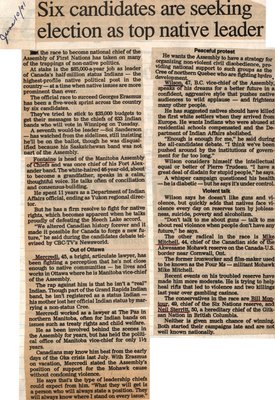"Six Candidates are Seeking Election as Top Native Leader"
- Full Text
- Six candidates are seeking election as top native leader
the race to become national chief of the Assembly of First Nations has taken on many of the trappings of non-native politics.
At stake is the $85,000-a-year job as leader of Canada's half-million status Indians - the highest-profile native political post in the country - at a time when native issues are more prominent than ever.
The official race to succeed Georges Erasmus has been a five-week sprint across the country by six candidates.
They've tried to stick to $35,000 budgets to get their messages to the chiefs of 633 Indian bands who will vote in Winnipeg on Tuesday.
A seventh would-be leader - Sol Sanderson - has watched from the sidelines, still insisting he'll be on the ballot, though he was disqualified because his Saskatchewan band was not part of the Assembly.
Fontaine is head of the Manitoba Assembly of Chiefs and was once chief of his Fort Alexander band. The white-haired 46-year-old, about to become a grandfather, speaks in a calm, thoughtful voice. He talks often of conciliation and consensus-building.
He spent 11 years as a Department of Indian Affairs official, ending as Yukon regional director.
But he has a firm resolve to fight for native rights, which becomes apparent when he talks proudly of defeating the Meech Lake accord.
"We altered Canadian history forever and it made it possible for Canada to forge a new future," he said during the candidates debate televised by CBC-TV's Newsworld.
Out of OttawaMercredi, 45, a bright, articulate lawyer, has been fighting a perception that he's not close enough to native communities - he lives and works in Ottawa where he is Manitoba vice-chief of the Assembly.
The rap against him is that he isn't a "real" Indian. Though part of the Grand Rapids Indian band, he isn't registered as a status Indian - his mother lost her official Indian status by marrying a non-status Cree.
Mercredi worked as a lawyer at The Pas in northern Manitoba, often for Indian bands on issues such as treaty rights and child welfare.
He as been involved behind the scenes in the Assembly for years, but has held the political office of Manitoba vice-chief for only 1 1/2 years.
Canadians may know him best from the early days of the Oka crisis last July. With Erasmus on vacation, Mercredi stated the Assembly's position of support for the Mohawk cause without condoning violence.
He says that's the type of leadership chiefs could expect from him. "What they will get is a person who will always state a position. They will always know where I stand on every issue."
Peaceful protestHe wants the Assembly to have a strategy for organizing non-violent civil disobedience, providing national support to such groups as the Cree of northern Quebec who are fighting hydro development.
Wilson, 47, B.C. vice-chief of the Assembly speaks of his dreams for a better future in a confident, aggressive style that pushes native audiences to wild applause - and frightens many other people.
He has suggested natives should have killed the first white settlers when they arrived from Europe. He wants Indians who were abused at residential schools compensated and the Department of Indian Affairs abolished.
"Enough is enough for me," he said during the all-candidates debate. "I think we've been pushed around by the institutions of government for far too long."
Wilson considers himself the intellectual equal or better of Pierre Trudeau. "I have a great deal of disdain for stupid people," he says.
A whisper campaign questioned his health - he is diabetic - but he says it's under control.
Violent talkWilson says he doesn't like guns and violence, but quickly adds that natives face violence every day on reserves torn by joblessness, suicide, poverty and alcoholism.
"Don't talk to me about guns - talk to me about real violence when people don't have any future," he says.
The other radical in the race is Mike Mitchell, 44, chief of the Canadian side of the Akwesasne Mohawk reserve on the Canada-U.S. border near Cornwall, Ont.
The former ironworker and film-maker used to be known as the Four Ms - militant Mohawk Mike Mitchell.
Recent events on his troubled reserve have made him more moderate. He is trying to help heal rifts that led to violence and two killings last year over gambling casinos.
The conservatives in the race are Bill Montour, 49, chief of the Six Nations reserve, and Neil Sterritt, 50, a hereditary chief of the Gitksan Nation in British Columbia.
Neither is given much chance of winning. Both started their campaigns late and are not well known nationally.
- Media Type
- Newspaper
- Publication
- Item Types
- Articles
- Clippings
- Description
- "The race to become national chief of the Assembly of First Nations has taken on many of the trappings of non-native politics."
- Date of Publication
- 10 Jun 1991
- Subject(s)
- Personal Name(s)
- Erasmus, Georges ; Sanderson, Sol ; Fontaine, Phil ; Mercredi, Ovide ; Wilson, Bill ; Trudeau, Pierre ; Mitchell, Mike ; Montour, Bill ; Sterritt, Neil.
- Corporate Name(s)
- Assembly of First Nations ; Manitoba Assembly of Chiefs ; Department of Indian Affairs.
- Local identifier
- SNPL002996v00d
- Collection
- Scrapbook #3
- Language of Item
- English
- Creative Commons licence
 [more details]
[more details]- Copyright Statement
- Public domain: Copyright has expired according to Canadian law. No restrictions on use.
- Copyright Date
- 1991
- Contact
- Six Nations Public LibraryEmail:info@snpl.ca
Website:
Agency street/mail address:1679 Chiefswood Rd
PO Box 149
Ohsweken, ON N0A 1M0
519-445-2954



